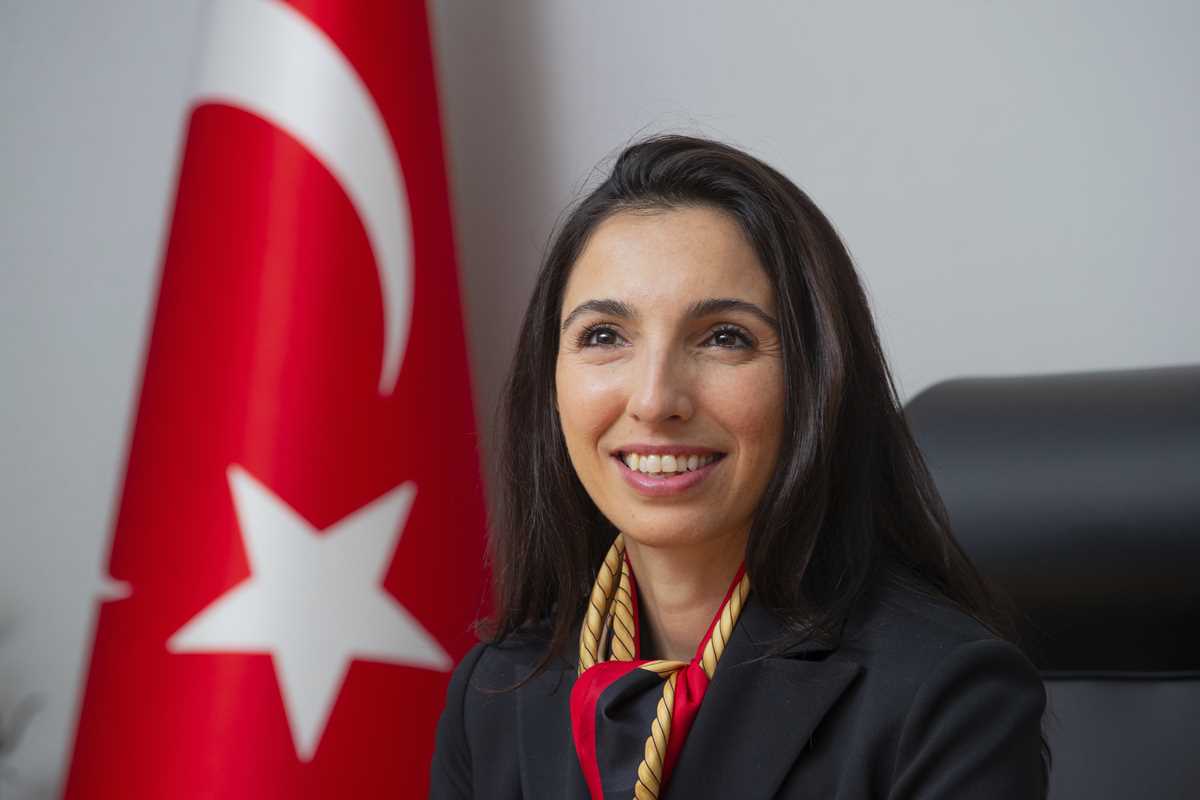 Governor of the Central Bank of Turkey Hafize Gaye Erkan poses for a photograph at her office in Ankara, Thursday, July 6, 2023. The governor of Turkey’s central bank has resigned only months after taking office amid allegations of improper use of power and family interference in the workings of the financial institutions. Erkan was the bank's first female chief. She announced her resignation on social media late Friday, Feb. 2, 2024 saying she was a victim of a “character assassination campaign” and would resign to spare her family further anguish. (Riza Ozel/Dia Images via AP, File)
Governor of the Central Bank of Turkey Hafize Gaye Erkan poses for a photograph at her office in Ankara, Thursday, July 6, 2023. The governor of Turkey’s central bank has resigned only months after taking office amid allegations of improper use of power and family interference in the workings of the financial institutions. Erkan was the bank's first female chief. She announced her resignation on social media late Friday, Feb. 2, 2024 saying she was a victim of a “character assassination campaign” and would resign to spare her family further anguish. (Riza Ozel/Dia Images via AP, File) A worker counts Turkish liras banknotes in an exchange currency shop in Istanbul, Turkey, Monday, Feb. 5, 2024. Turkey has seen its fifth central bank leader depart in as many years as Hafize Gaye Erkan, the first woman in the top role, stepped down after just eight months in the job. (AP Photo/Francisco Seco)
A worker counts Turkish liras banknotes in an exchange currency shop in Istanbul, Turkey, Monday, Feb. 5, 2024. Turkey has seen its fifth central bank leader depart in as many years as Hafize Gaye Erkan, the first woman in the top role, stepped down after just eight months in the job. (AP Photo/Francisco Seco) Workers upload goods inside a track at Eminonu commercial quarter in Istanbul, Turkey, Monday, Feb. 5, 2024. Turkey has seen its fifth central bank leader depart in as many years as Hafize Gaye Erkan, the first woman in the top role, stepped down after just eight months in the job. (AP Photo/Francisco Seco)
Workers upload goods inside a track at Eminonu commercial quarter in Istanbul, Turkey, Monday, Feb. 5, 2024. Turkey has seen its fifth central bank leader depart in as many years as Hafize Gaye Erkan, the first woman in the top role, stepped down after just eight months in the job. (AP Photo/Francisco Seco) Turkish liras banknotes are piled in an exchange currency shop in Istanbul, Turkey, Monday, Feb. 5, 2024. Turkey has seen its fifth central bank leader depart in as many years as Hafize Gaye Erkan, the first woman in the top role, stepped down after just eight months in the job. (AP Photo/Francisco Seco)
Turkish liras banknotes are piled in an exchange currency shop in Istanbul, Turkey, Monday, Feb. 5, 2024. Turkey has seen its fifth central bank leader depart in as many years as Hafize Gaye Erkan, the first woman in the top role, stepped down after just eight months in the job. (AP Photo/Francisco Seco)ISTANBUL (AP) — Turkey has seen its fifth central bank leader depart in as many years as Hafize Gaye Erkan, the first woman in the top role, stepped down after just eight months in the job.
She announced her resignation late Friday after recent claims of nepotism emerged in local media, allegations that Erkan, a former senior Goldman Sachs executive, strongly rejected.
While President Recep Tayyip Erdogan has previously fired central bank governors who spurned his unorthodox belief in keeping interest rates low to fight inflation — which runs contrary to mainstream economic thinking — Erkan has blamed a “major reputation assassination campaign.”
Her replacement, Deputy Governor Fatih Karahan, indicates that Turkey will maintain higher interest rates overseen by Finance Minister Mehmet Simsek.
A series of rate hikes after Erdogan was reelected in May has marked a turnaround from his unconventional policies that economists say helped trigger a currency crisis and drove up the cost of living, leaving households struggling to afford basic goods.
Here are key things to know about the central bank shakeup and what it means for Turkey's battered economy:
WHY IS THERE A NEW CENTRAL BANK LEADER?Erkan resigned after weeks of media stories about her father’s undue influence in the central bank’s Istanbul office.
Although she received some degree of support from Erdogan, who spoke out against “unreasonable rumors “ that undermined Turkey’s economic progress, critics continued to question her leadership.
In particular, they highlighted a magazine interview in which she said her family had moved in with her parents because they could not afford to rent a home in Istanbul due to high prices.
WHY DOES THE SHAKEUP MATTER?Previous changes in central bank leadership has seen Erdogan row back on efforts to bring inflation under control through interest rate hikes.
Following last May’s parliamentary and presidential elections, Simsek and Erkan were appointed to tackle the country’s economic woes through higher borrowing costs. Interest rates have gone from 8.5% in June to 45% late last month, a move widely welcomed by foreign investors who had previously turned their backs on Turkey.
Despite such hikes, inflation remains high — consumer prices rose to an eye-watering 64.86% in January from a year earlier, according to figures released Monday, up from 64.77% seen in December.
The Saturday appointment of Karahan, another member of Finance Minister Simsek's team, strongly suggests there will be no reversal of economic policy this time.
WHO IS FATIH KARAHAN?Like Erkan and Simsek, the new bank governor has plenty of experience working in the U.S. He was brought in as the bank’s deputy head at the same time Simsek took over the Finance Ministry and Erkan was appointed to lead the central bank.
Karahan, who is in his early 40s, completed his master’s degree and doctorate in economics at the University of Pennsylvania before starting a 10-year career at the Federal Reserve Bank of New York in 2012.
He was then appointed chief economist at Amazon, while working as a part-time lecturer at Columbia and New York universities.
WHAT’S NEXT FOR TURKEY'S ECONOMY?Following Karahan’s appointment on Saturday, Simsek said those running the Turkish economy were “committed to supporting the disinflation process through restoring fiscal discipline.”
He added: “Our president has full support and confidence in our economic team and the programme we are implementing.”
Turkey faces local elections in March that will see Erdogan attempt to retake several major cities won by the opposition in 2019, including Ankara and Istanbul.
It's possible that a poor showing for the president’s party could shake his resolve to stick with Simsek and his “rational” approach.
The argument in favor of a further rate hike later this month was “compelling and would underline the central bank’s commitment to tackle inflation” while also building Karahan’s credibility, said Liam Peach, senior emerging markets economist at Capital Economics.
However, Can Selcuki, managing partner at Istanbul Economy Research, said another rate hike seemed unlikely even though Turkey’s economy “is not out of the woods by a long shot.”
“It’s not the governor that matters — it’s Simsek. As long as he’s in position, he will ensure the current policy’s not changed,” Selcuki said, referring to Karahan’s appointment.
Before you make your next trade, you'll want to hear this.
MarketBeat keeps track of Wall Street's top-rated and best performing research analysts and the stocks they recommend to their clients on a daily basis.
Our team has identified the five stocks that top analysts are quietly whispering to their clients to buy now before the broader market catches on... and none of the big name stocks were on the list.
They believe these five stocks are the five best companies for investors to buy now...
See The Five Stocks Here
MarketBeat's analysts have just released their top five short plays for May 2024. Learn which stocks have the most short interest and how to trade them. Click the link below to see which companies made the list.
Get This Free Report